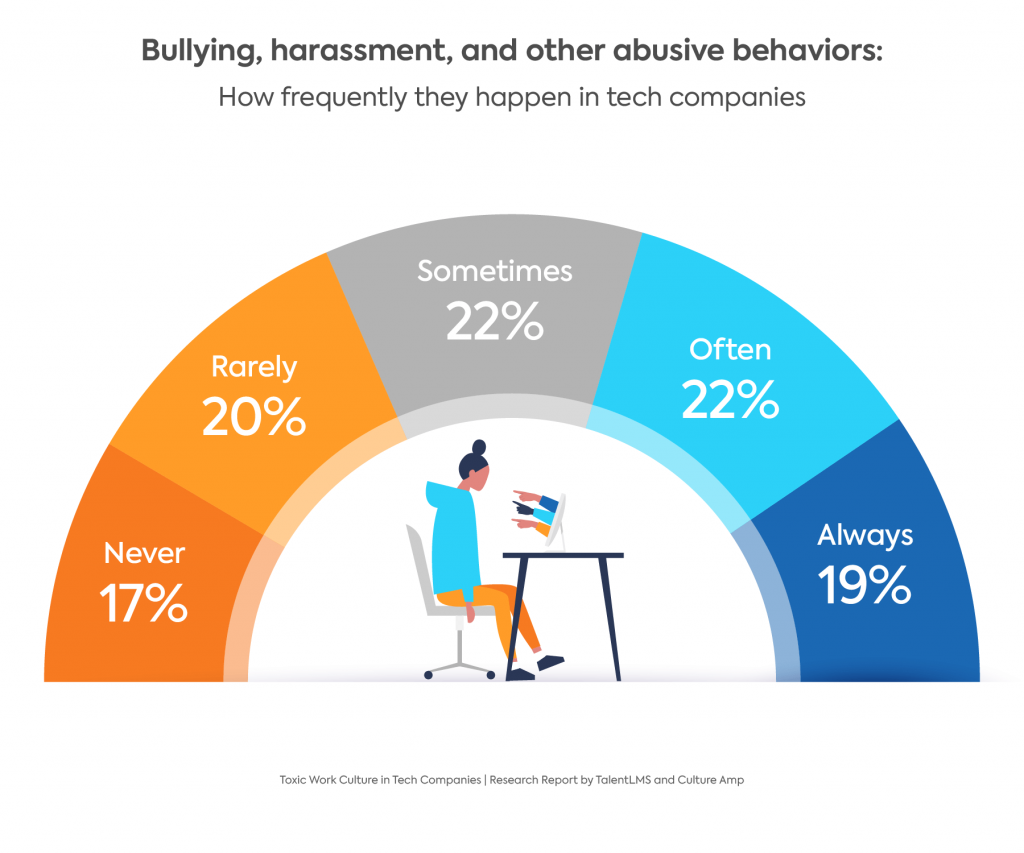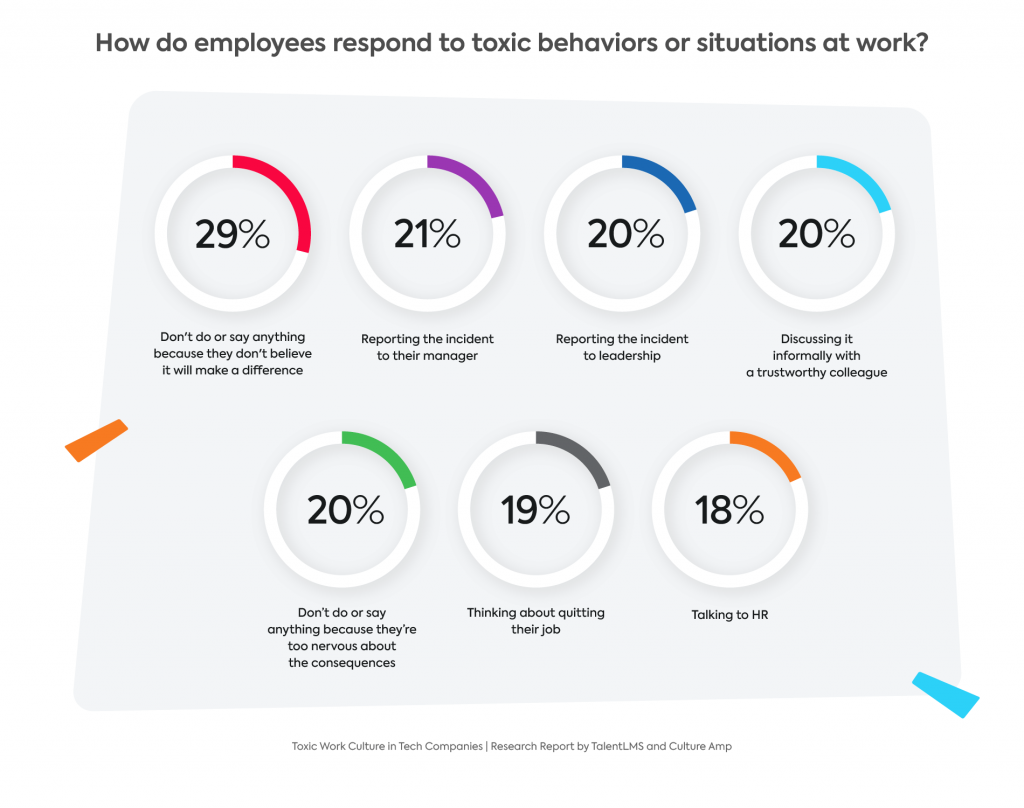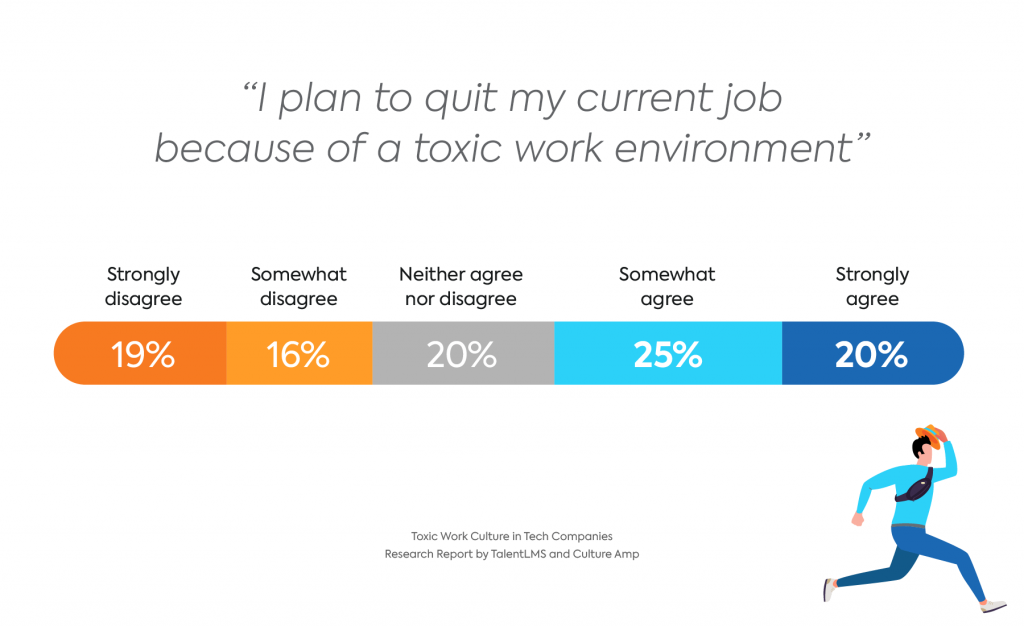Deconstructing toxicity: Mechanics of misconduct
Toxicity in the workplace is a monster with many heads: Unfairness, mistreatment, discrimination, harassment, offensiveness, oppression. This survey was built upon the “The Big Five” framework for identifying toxicity, and we examined how frequently related behaviors occur.
Let’s see what the results show.
Disrespectful
MIT Sloan revealed that respect toward employees rises to the top of the list of cultural elements that matter. Having respect from their peers is a basic need for professionals, and when that need is not met, it points to an out-of-balance environment.
In our survey, 42% of respondents said that managers in tech companies with toxic work cultures are frequently inconsiderate and disrespectful of employees, showing that this corrosive component of toxicity is far from being eliminated. Building respectful workplaces should be a priority for employers, along with rooting out any disrespectful behavior.
Abusive
A national study on the prevalence of workplace aggression in the U.S. has found that 13% of employees encountered workplace aggression on a weekly basis. Unfortunately, our survey also found that bullying and harassment are prevalent in the workplace: according to 40% of employees these incidents happen frequently, while 22% say they happen sometimes. Only 37% of employees responded that instances of bullying and harassment happen rarely or never. It’s spine-chilling that tech, supposedly one of the most advanced sectors, features such disturbing statistics underneath the shiny and progressive facade.

Non-inclusive
The non-inclusive environment is another major element of a broken workplace culture. A 2017 Tech Leavers study by Kapor Center reported that the majority of tech employees would have stayed in their company if it had taken steps to make the company culture more fair and inclusive. The TalentLMS and Culture Amp research report reveals that discrimination and unfair treatment—because of employees’ age, race, or gender—frequently happen in tech companies with toxic work culture, according to over 40% of respondents.
Specifically, 43% say discrimination and unfair treatment because of employees’ age happens frequently; 42% mention employees’ race as the most frequent reason; and 41% say that discrimination and unfair treatment is frequently based on employees’ gender.
Unethical
Ethics is a key component of a positive culture that inspires trust. Part of it is compensating fairly and orderly employees for the work they do. Turns out, that’s not always the case. We asked the respondents if they were expected to be on call and respond to work-related calls, messages, and emails outside of working hours. And a staggering 43% said they are, indeed, expected to do so frequently. Moreover, 44% agree they are not acknowledged and fairly rewarded for their work.
Employees not being compensated for their work means they are not treated fairly and ethically. To restore trust and rebuild morale, employers should banish these damaging practices.
Cutthroat
Another destructive ingredient of a hostile work environment is a cutthroat culture marked with backstabbing, taking credit for someone else’s work, and poor collaboration. And it appears to happen in close to half of tech companies: 42% of the respondents say antagonism and territoriality between different teams are frequent in their organizations.
At the same time, 44% of respondents said that undeserved silencing of employees—cutting them out of key meetings and decisions—frequently happens in their company. Another example of non-collegial and undermining behavior is ‘tech-shaming:’ 41% of employees say that shaming others for not knowing the latest tech tools and terms often occurs in their workplace.
Employees feel powerless when facing a toxic work culture
The data so far have revealed several dark corners of the culture in tech companies. And it’s crushing to see how powerless employees feel in the face of toxicity.

When encountering toxic behaviors or situations at work, almost half (49%) of surveyed employees said they don’t do or say anything—29% because they don’t believe it will make a difference, and 20% because they’re too nervous about the consequences.
It’s regretable to see just how many employees give up silently, without ever speaking up.
Another finding that highlights the silent despair of employees is that almost half (45%) say toxic culture has pushed them to quiet quitting. They’re left demoralized, underproductive, and silent. To speak up, employees need to be empowered—and, right now, they’re not.
It is a shame to find that so many employees feel powerless or afraid to speak up. Oftentimes, silence can perpetuate the problems in organizations because they remain hidden to those that might be able to do something about them. Shining a spotlight on deep rooted problems is the first step to creating change. Those that are brave enough to speak up (especially senior leaders) can begin to create new norms that make it easier for others to do the same.
—Dr Joel Davies, Senior People Scientist at Culture Amp
The dire cost of a toxic work culture

Unhealthy work culture causes multiple losses across an organization. But the heaviest loss is the devastating effect toxicity has on people’s health. Employees exposed to toxic behaviors or situations at work are 35% to 55% more likely to be diagnosed with a serious physical disease. In addition, multiple research suggests that when employees are experiencing unfair and unjust behaviors, their health can severely worsen.
The data from our survey confirms this: 48% of employees agree that the toxic work environment is negatively impacting their physical health.
What’s more, 45% of survey respondents agree that the toxic work environment is impacting their mental health. At the same time, 46% suffer from burnout because of it. This link between toxicity and worsened mental health is not new: McKinsey recently reported that toxic workplace behavior is the biggest predictor of employee burnout symptoms and intent to leave.
No wonder 43% of employees working in toxic software companies take PTO or sick days just to have a break from it all.
In addition to crushing the physical and mental health of employees, toxic work culture is the key driver of attrition—as numerous research has shown. Our survey confirms this link, with 45% of employees saying they plan to quit their job because of a toxic work environment.
Support the well-being of your teams.
Access a library of ready-made soft skills courses, including leading with respect, recognizing and rewarding others, and power of patience.

Data also highlights other negatively affected areas such as performance, confidence, and focus. Some of the additional findings:
- The toxic work culture negatively affects performance, 48% of employees agree.
- 45% of employees say that they often get distracted at work because of their toxic environment.
- The toxicity at work is damaging the confidence of 45% of employees.




